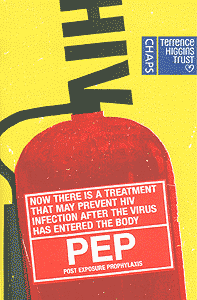hiv
Tap or click on the headings below
PrEP & PEP to stop you getting HIV:
- PrEP is a pill taken daily to stop you getting HIV if you're having sex without condoms. Gay and bisexual men are one of the priority groups for PrEP. For details of other priority groups and more info, go to » nhsinform.scot/hiv-prep-pre-exposure-prophylaxis
- PEP is an emergency medication that can stop HIV taking hold if you've been at risk of HIV transmission e.g. anal sex without a condom. For it to work, you need to start it within 72 hrs, ideally within 24 hrs. It's available from Sexual Health D&G and from hospital A&E.
More info: tht.org.uk/hiv/protection/pep-post-exposure-prophylaxis-hiv
What is HIV?
HIV is a virus which attacks the body's defence system (immune system), and makes you less able to fight off infections. You may have HIV for many years and feel quite well. When the immune system begins to break down, infections and cancers can develop, known as AIDS (acquired immune deficiency syndrome).
What are the symptoms of HIV?
Most people with HIV (but not all) will have a short flu-like illness 2 to 6 weeks after getting the virus. This may cause a sore throat , fever or a rash over the body. After these symptoms disappear, HIV may not cause any symptoms for many years, although the virus continues to damage your immune system.
This means many people with HIV do not know they're infected.
How do you get HIV?
HIV can be passed on through infected blood, semen, vaginal and anal fluids and breast milk.
The most common way of getting HIV in the UK is through having anal or vaginal sex without a condom.
Other ways of getting HIV include:-
- sharing needles, syringes or other injecting equipment
- transmission from mother to baby during pregnancy, birth or breastfeeding
The chance of getting HIV through oral sex is very low and will be dependent on many things, such as whether you receive or give oral sex and the oral hygiene of the person giving the oral sex.
How do you get tested for HIV?
The only way to find out if you have HIV is to have an HIV test. This involves testing a sample of your blood for signs of the infection.
Testing can be done by your GP or sexual health clinic.
Certain groups of people are advised to have regular tests because they are at higher risk. These include men who have sex with men and people who share needles, syringes or other injecting equipment.
How is HIV treated?
HIV is treated with tablets called antiretroviral drugs which need to be taken every day. They work by stopping the virus replicating, allowing the immune system to repair itself and preventing further damage. Whilst the drugs do not get rid of HIV, they are very effective and help keep you fit and healthy. The sooner treatment starts the more effective it will be.
The aim of treatment is to have an undetectable viral load. This means the amount of HIV virus in your body is below a certain level. If you have had an undetectable viral load for more than 6 months (confirmed by your HIV doctor) and you continue to take your treatment as directed and you do not have an STI (for example, chlamydia, gonorrhoea or syhilis) you cannot pass HIV on through sex. This is called untransmittable or U = U, where undetectable equals untransmittable. However, it is important to remember that you can still pass HIV on through routes other than sex such as sharing injecting equipment.
With an early diagnosis and effective treatment, most people with HIV will not develop any AIDS-related illnesses and will live a near-normal lifespan. So being tested for HIV is really important.
How can you protect yourself from HIV?
Anyone who has sex without a condom or shares needles is at risk of HIV infection.
There are many effective ways to prevent or reduce the risk of HIV infection, including:-
- using a condom/dam for vaginal, anal and oral sex
- post-exposure prophylaxis (PEP)
- pre-exposure prophylaxis (PrEP)
- treatment for HIV to reduce the viral load to undetectable
- if you use drugs, never sharing needles or other injecting equipment, including syringes, spoons and swabs. Needle exchanges are available throughout the region.
Health Protection Team
We provide information about, prevention, testing & offer training to NHS staff, statutory and non statutory organisations and members of the public who are at increased risk of catching a bloodborne virus.
Tel: 01387 272724
Clinical Nurse Specialist
Marie Murray Blood borne Virus Clinical Nurse Specialist DGRI
Tel: 01387 241 991
Information for those infected with a borne virus, prevention, testing
and treatment.
Testing and PrEP are available from:
- Sexual Health D&G, Dumfries.
» Clinics
More information
Post exposure prophlaxis - pep

What is PEP?
PEP is a 28 day course of medicines taken to reduce the risk of a person becoming infected with HIV after they may have come into contact with the virus.
When is PEP recommended?
PEP is recommended after exposure to a person known to have or thought to be at high risk of HIV. The exposure may be through unprotected sex or by sharing injecting equipment or in some needle stick injuries.
It is important to be aware that PEP is only effective if it is started within 72 hours of the exposure and the sooner the treatment is started, the better it works. If you think you need PEP ask for help immediately. Do not delay, as every hour counts.
If you are unsure, you should seek urgent advice from your sexual health clinic. Out of normal office hours, advice can be sought from Accident and Emergency. You should also seek advice if you have been sexually assaulted.
Is PEP effective?
It is important to remember that in most circumstances the risk of catching HIV from either a single needle stick injury or from a single sexual act is small. Taking the 28-day course of anti HIV medicine should make that risk even smaller.
PEP should be started as soon as possible, preferably within an hour, but always within 72 hours of possible contact with the virus.
Starting PEP as early as possible, taking every dose as prescribed and completing the 28-day course provides the best protection against infection. PEP does not reduce the risk of HIV infection to zero, and this is one of the reasons why you will be given appointments for check-ups during and after the PEP course.
Where can you get PEP?
You can get PEP from sexual health clinics.
If these are closed then you should contact your nearest Accident and Emergency (A and E) department. If you already have HIV and the PEP is for someone you've had sex with then try your HIV clinic.
Does PEP have side effects?
Most people who take PEP will have no side effects, but like all medicines, unwanted symptoms can occur. These include feeling sick, a lack of energy, dizziness, diarrhoea, loss of appetite, trouble sleeping, headache and stomach ache.
If you develop a flu-like illness or a skin rash while taking PEP or in the follow up period after stopping PEP you should contact the clinic as soon as possible. This is because the symptoms may be a sign of HIV infection.
What tests Are needed?
Blood tests will be taken to check if you already have HIV and also to check your liver and kidneys because PEP can rarely cause liver or kidney damage.
You may also be offered tests for other STI's such as chlamydia, gonorrhoea and syphilis.
It is important that you have an HIV test 4 to 8 weeks after you finish PEP because the treatment does not work every time and some people may be infected with HIV despite taking PEP. You should not have any unprotected sex or share razors or toothbrushes with other people until you have been given the all clear.
What are the chances someone will get PEP?
Guidelines have been given to Sexual Health Clinics and hospitals that help doctors decide if PEP should be given. A doctor will need to ask questions about what kind of sex happened, when and who with. PEP is not always needed after unprotected sex.
Things to remember about PEP
- PEP might stop a person getting infected with HIV
- it must be started as soon as possible after unsafe sex or a condom not working - within 24 hours is best and no later than 72 hours (3 days)
- it means taking anti-HIV drugs for 4 weeks
- side effects can occur but are usually mild
- it's not guaranteed to work
- not everyone wanting PEP will get it - doctors decide who gets it using the information given to them
- PEP is not available at all clinics or hospitals
More Information
For more detailed information on PEP visit: www.tht.org.uk/sexual-health/HIV-STIs/HIV-AIDS/Post-exposure-prophylaxis
Treatment is available from Sexual Health D&G or Accident and Emergency at Dumfries and Galloway Royal Infirmary
Testing and treatment is available from:

